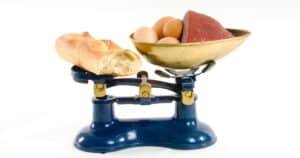Last Updated on 6 June 2024
Understanding your body’s metabolism is crucial for effective weight management. Many struggle to lose or maintain a healthy weight because they are unaware of their basal metabolic rate (BMR). This article will guide you through calculating your BMR accurately and provide tips on maximizing the accuracy of your BMR calculations. Are you curious about your BMR? Our free BMR calculator lets you find out what your BMR is today.
Understanding Basal Metabolic Rate (BMR)
Basal Metabolic Rate (BMR) measures your body’s metabolism at rest. It represents the calories your body needs to perform essential functions such as breathing, circulation, cell production, nutrient processing, protein synthesis, ion transport production and digestion. Age, hormone levels, body fat percentage, and muscle mass have an impact on your BMR. Muscle mass is more metabolically active than fat, so individuals with a higher muscle mass tend to have a higher BMR.
Age and hormone levels can also affect your BMR, with BMR generally decreasing as you age. Nutrient processing is also crucial in determining your BMR, as the body requires energy to process and utilize nutrients from food. Understanding the science behind BMR, including nutrient processing, can help you make informed decisions about your diet and exercise habits.
Why Your BMR Matters for Weight Management
Understanding your BMR is crucial for weight management because it provides a baseline for calculating your calorie needs. By knowing your BMR and waist circumference, you can determine the number of calories you need to consume to maintain your current weight or create a calorie deficit for weight loss. A calorie deficit occurs when you consume fewer calories than your body needs, leading to weight loss. Knowing your BMR can also help you understand how your body composition, including muscle mass and body fat, affects your metabolism and overall calorie needs.
Calculating Your BMR Accurately
To calculate your BMR accurately, you can use online BMR calculators or perform the calculation manually using the Harris-Benedict equation. These methods consider factors such as your sex, age, height, and weight to estimate your BMR. It’s important to note that BMR is slightly different from Resting Metabolic Rate (RMR), which accounts for calories burned at rest with minimal movement. However, for practical purposes, BMR and RMR are often used interchangeably. To accurately calculate your daily calorie needs, you can multiply your BMR by an activity factor to determine your Total Daily Energy Expenditure.
Factors Influencing Your BMR
Several factors influence your Basal Metabolic Rate (BMR), including muscle mass, body fat, age, and hormone levels. Muscle mass is more metabolically active than fat, meaning individuals with a higher muscle mass tend to have a higher BMR. On the other hand, body fat has a lower metabolic rate, so individuals with higher body fat percentages tend to have a lower BMR.

Age is another factor affecting BMR, as metabolism generally slows down. Hormone levels, such as thyroid hormones, can also impact BMR, as imbalances can lead to changes in metabolism. Additionally, pregnancy can also increase BMR due to the body’s need to support the growth and development of a fetus. This is why pregnant women tend to eat more than usual.
Step-by-Step Guide to Our Free BMR Calculators
Online BMR calculators are a convenient way to estimate your Basal Metabolic Rate (BMR) and determine your total daily energy expenditure. Follow these steps to use our online BMR calculators effectively:
- Enter your sex, age, height, and weight into the calculator.
- Select your activity level, which ranges from sedentary to very active.
- Click on the “calculate” button to get your estimated BMR.
- Take note of your BMR and use it to determine your total daily calorie needs.
Remember that online BMR calculators provide estimates, and individual variations may exist. Consulting with a healthcare professional or registered dietitian can provide personalized guidance based on your needs.
Tips to Maximize the Accuracy of BMR Calculations
To maximize the accuracy of your BMR calculations, consider the following tips:
- You can calculate your BMR manually using the Harris-Benedict equation, which considers factors such as lean body mass.
- Incorporate your physical activity level into your BMR calculation to estimate your total daily energy expenditure.
- Regularly reassess and adjust your BMR calculation as your body composition and physical activity level change.
- Consult a registered dietitian or healthcare professional for personalized guidance and assistance in accurately calculating your BMR.
Common Mistakes to Avoid in BMR Calculation
When calculating your Basal Metabolic Rate (BMR), it’s important to avoid common mistakes that can lead to inaccurate estimations. Some common mistakes to avoid include:
- Using an incorrect mathematical formula or equation to calculate your BMR. Use a reliable and accurate formula, such as the Harris-Benedict equation.
- Relying solely on online calculators without considering individual factors and variations.
- Neglecting to consult with a registered dietitian or healthcare professional for personalized guidance and assistance in accurately calculating your BMR.
- Failing to reassess and adjust your BMR calculation as your body composition, physical activity level, or health conditions change.
How to Adjust BMR Calculations for Muscle Mass
Adjusting your Basal Metabolic Rate (BMR) calculations for muscle mass is important for an accurate estimation of calorie intake. Muscle is more metabolically active than fat, meaning it burns more calories at rest. To adjust your BMR calculations for muscle mass:
- Determine your lean body mass by subtracting your body fat percentage from your total body weight.
- Estimate your BMR using your lean body mass, which reflects the metabolically active tissue in your body.
- Adjust your calorie intake based on your BMR to support muscle growth and maintenance.
It’s important to note that muscle mass adjustments to BMR calculations may not be necessary for everyone, as individual variations can exist. Consulting with a registered dietitian or healthcare professional can provide personalized guidance based on your specific needs and goals.
Applying BMR to Your Diet and Exercise Plan
Understanding your Basal Metabolic Rate (BMR) is crucial when applying it to your diet and exercise plan. Your BMR provides a starting point for determining your total daily calorie needs, also known as your total number of calories. By consuming fewer calories than your BMR, you can create a calorie deficit and promote weight loss. However, it’s important to make sure your calorie intake is still sufficient to meet your nutrient needs. Incorporating regular exercise can also help increase your total daily calorie expenditure, further supporting weight management goals.
Tailoring Your Caloric Intake Based on BMR
Tailoring your caloric intake based on your Basal Metabolic Rate (BMR) is essential for weight management. To do this:
- Calculate your BMR using a reliable method, such as the Harris-Benedict equation or online BMR calculators.
- Determine your total daily calorie needs by considering your activity level and goals.
- Create a calorie deficit by consuming fewer calories than your daily calorie needs for weight loss.
- Ensure that your calorie intake provides adequate nutrients for optimal health and well-being.
- Monitor your progress and adjust your caloric intake based on your BMR and weight management goals.
Designing an Exercise Regimen That Complements Your BMR
Designing an exercise regimen that complements your Basal Metabolic Rate (BMR) is important for maximizing calorie expenditure and supporting weight management. Consider the following tips:
- Incorporate cardiovascular exercise and strength training to increase your daily energy expenditure.
- Aim for at least 150 minutes of moderate-intensity aerobic activity or 75 minutes of vigorous-intensity aerobic activity per week.
- Include resistance training exercises to build muscle and increase your BMR.
- To stay active throughout the day, incorporate movement into your daily routine, such as taking the stairs instead of the elevator or going for short walks.
- Remember that individual variations in BMR and exercise response exist, so it’s essential to listen to your body and adjust your exercise regimen.
The Role of BMR in Weight Loss and Fitness Goals
Understanding your Basal Metabolic Rate (BMR) is crucial for achieving weight loss and fitness goals. Your BMR provides a baseline for determining the number of calories you need to consume to maintain your current weight or create a calorie deficit for weight loss. By incorporating regular exercise and adjusting your caloric intake based on your BMR, you can support weight management and achieve your fitness goals.
Strategies to Increase Your BMR Naturally
If you’re looking to increase your BMR naturally, there are several strategies you can try. First and foremost, focus on increasing your lean body mass and appetite. Muscle tissue is more metabolically active than fat, so the more muscle you have, the higher your BMR will be. Incorporating strength training exercises into your fitness routine can help you build and maintain muscle mass and a healthy appetite.

Another way to boost your metabolism is by increasing your physical activity levels. Regular exercise, particularly high-intensity interval training (HIIT), can increase your metabolic rate both during and after your workout. Aim for at least 150 minutes of moderate-intensity aerobic activity or 75 minutes of vigorous-intensity aerobic per week, along with muscle-strengthening activities twice a week.
Additionally, make sure you’re getting enough quality sleep. Sleep deprivation can negatively impact your metabolic rate and hormone levels, leading to weight gain and a slower BMR. Aim for 7-9 hours of sleep per night to support a healthy metabolism.
Lastly, don’t forget about the importance of nutrition. Eating a balanced diet that includes plenty of protein, whole grains, fruits, and vegetables can support a healthy metabolism. Avoid crash diets or extreme calorie restriction, as these can slow down your BMR and may lead to muscle loss.
Monitoring BMR Changes and Their Implications
Monitoring changes in your BMR can provide valuable insights into your overall health and body composition. If you notice a significant decrease in your BMR without any changes in your lifestyle, it may be a sign of an underlying health condition. Conditions such as hypothyroidism or hormonal imbalances can affect your metabolism and lead to a lower BMR.
Similarly, changes in your body composition can also impact your BMR. If you lose muscle mass or gain fat mass, your BMR may decrease. This is why it’s important to focus on maintaining or increasing your lean body mass through regular strength training exercises.
Monitoring your BMR can also help you track the effectiveness of your weight loss efforts. If you’re in a calorie deficit and losing weight, you would expect to see a decrease in your BMR. However, if your BMR decreases disproportionately to your weight loss, it may indicate that you’re losing muscle mass instead of fat.
If you’re concerned about your BMR or notice any significant changes, it’s best to consult a healthcare professional or registered dietitian. They can help you assess your overall health and provide personalized recommendations.
Understanding your Basal Metabolic Rate (BMR) is key to managing your weight effectively. By calculating your BMR accurately and considering factors like muscle mass, you can tailor your diet and exercise plan for maximum results. Remember, monitoring changes in your BMR and adjusting your regimen accordingly play a significant role in achieving your fitness goals. By maximizing the accuracy of your BMR calculations and incorporating strategies to naturally increase your BMR, you can unlock the potential of your metabolism for successful weight management. Embrace these tips and transform your approach to health and fitness today!









